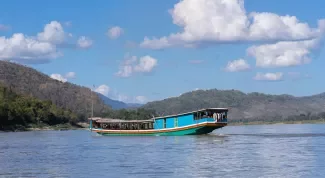ADB Assists the Lao People's Democratic Republic in Drafting Disaster Management and Climate Change Laws

Lao People's Democratic Republic (PDR) is a landlocked country with unique geographical regions and conditions resulting in a high risk from natural disasters including floods, droughts, storms, and landslides. The country relies on natural resources and agricultural production with limited disaster prevention, preparedness, and response mechanisms. Climate change further exacerbates these risks across the nation.
ADB recognizes disaster prevention as a crucial activity in mitigating climate change. To address this and protect the people of Lao PDR, ADB partnered with the Lao PDR Government to draft a transformative Disaster Management Law. The Law sets out the core components of disaster prevention, such as data collection, risk mapping, the establishment of risk information systems accessible to the public, early warning systems, as well as disaster control and post-disaster recovery strategies. It also outlines the rights and obligations of disaster victims and establishes a Disaster Management Fund to finance emergency aid, repair of necessary infrastructure, search, and rescue.
Subsequently, the Lao PDR National Strategy on Disaster Risk Reduction (NSDRR) was adopted in 2021. The Department of Social Welfare, Ministry of Labor and Social Welfare expressed “sincere appreciation to ADB…for providing both technical and financial support on research, consultations and drafting of this NSDRR.”
ADB also assisted the nation in drafting its Climate Change Decree which requires mainstreaming climate change issues into national and regional socio-economic development plans. It includes both critical adaptation and mitigation mechanisms which include increasing carbon sinks and mandating the development of a data and information systems on climate change.